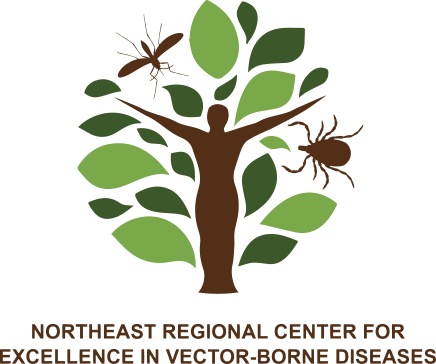
Master of Science in Entomology: Vector-Borne Disease Biology Curriculum
Program Update: The MS Entomology: Vector-Borne Disease Biology program will not be accepting future students to this program.
We have partnered with the Department of Entomology at Cornell University to offer an interdisciplinary Master of Science program in vector-borne disease biology. This program falls within the Medical and Veterinary Entomology Concentration, and combines entomology and public health course work from the College of Agriculture and Life Sciences and College of Veterinary Medicine.
Program Highlights
Our goal for the MS in Entomology program in vector-borne disease biology is to provide a foundation from which graduates can immediately enter the workforce in vector surveillance, control, and related fields. Students will experience an innovative curriculum covering vector biology and ecology, public health competencies, and the most recent advances in vector control and vector-borne disease prevention.
During this two-year program, students will interact with leading medical entomologists, virologists, epidemiologists, field ecologists, and statistical modelers across multiple academic, state, and federal government and public health institutions in the Northeast. Students will also gain hands-on experience in the field through coursework and a required 10-week summer internship with a regional partner
Graduates of this program can immediately enter the workforce in a wide range of roles, including biologists and control specialists for vector control districts and agencies; program coordinators and managers for public health agencies and programs; scientists working with agricultural and cooperative extension programs; and more.
Core Competencies
Graduates of the program will demonstrate a high level of competency in the following skills and knowledge areas:
- Arthropod biology, behavior, and taxonomy
- Vector-borne pathogens of global and regional importance
- Vector-borne disease prevention and control strategies and systems
- Impact of public health systems on vector-borne disease transmission
- Professionalism in the public health and vector biology workforce
- Core competencies of public health professionals and vector biologists
Program Qualifications
Students enrolled in the MS Entomology: Vector-Borne Disease Biology Program will be fully supported through US federal funding awarded to NEVBD-TEC. Priority consideration for program admission will be given to US domestic applicants.
Minimum Qualifications
Program applicants must meet the following pre-requisites established by the Cornell University Entomology Department prior to applying:
- Education level: Bachelor degree or equivalent
- GPA: No minimum required
- GRE: The Field of Entomology does not accept or use the Graduate Record Examination (GRE) general or advanced “subject” test in any aspect of the application process. GRE is not required.
- Other Requirements: A general Insect Biology course or plan to take Insect Biology when you arrive.
Preferred Qualifications
Applicants with an educational background in one or more of the following areas, or closely related fields, will have higher success in the MS program:
- Biological sciences
- Entomology
- Environmental science
- Molecular biology
- Public health
- Wildlife and conservation
Program Requirements
Graduates of the MS in Entomology Vector-Borne Disease Biology program are required to complete a mixture of instructional credits and master-level thesis research credits. Students are required to establish a committee, including Dr. Laura Harrington and one other faculty member.
Summer Internship:
A mandatory 10-week summer internship at a federal, state, or local health department or vector control agency is required. NEVBD will provide salary and housing support for summer internship students. Students can select from the following topical areas for their internship project:
- Vector biology
- Vector surveillance
- Vector control
- Insecticide resistance
- Repellents
- Big data management
- Statistical modeling
- Public health messaging
- Public perceptions of vector-borne disease
Thesis Research:
Students will be expected to complete a written, publication-quality thesis based in part on their summer internship programs.
Final Practical and Written Exam:
Students will take a final oral practical exam and a written exam. A passing grade of 75 is required to complete the MS in Entomology program.
Required Courses
This program includes 8 required core courses covering topics of entomology and vector biology (20 credit hours), and 5 required core courses covering public health topics and competencies (14 credit hours). Students must also dedicate at least 2 credit hours each semester to master-level thesis research.
This program is designed to be completed in two years. Please visit the Cornell Class Roster to learn more about the courses listed below.
Core Entomology and Vector Biology Courses
Total credits: 20
| Course | Semester | Credits |
|---|---|---|
| ENTOM 2120 + LAB Insect Biology | Fall | 4 |
| ENTOM 3030 Applied Statistics: Biological Experiments in Practice | Spring | 4 |
| ENTOM 4520 Introduction to Disease Vectors | Fall | 3 |
| ENTOM 4521 Introduction to Disease Vectors Lab | Fall | 1 |
| ENTOM 6520 Malaria Biology and Control | Spring - Odd Years | 2 |
| ENTOM 6530 Control of Disease Vectors | Spring - Even Years | 2 |
| ENTOM 6540 Vector Biology in Practice | Spring | 2 |
| ENTOM 7670 Professional Development in Entomology | Fall | 2 |
Core Public Health Courses
Total credits: 13
| Course | Semester | Credits |
|---|---|---|
| VTPEH 6101 Public Health Foundations I | Fall | 2 |
| VTPEH 6102 Public Health Foundations II | Spring | 3 |
| VTPEH 6104 Epidemiology in Practice | Fall | 3 |
| VTPEH 6175 Introduction to GIS for Public Health | Fall | 3 |
| VTPEH 6184 Public Health Practice: Communication | Fall | 2 |
Research/Thesis Courses
| Course | Semester | Credits |
|---|---|---|
| ENTOM 8900 Master-level Thesis Research | Fall; Spring; Summer | Varies |
| IRB and IACUC training certification (online) | Fall; Spring | None |
Elective Courses
| ENTOM 6900 Seminar in Ecology & Evolution of Infectious Diseases | Fall; Spring | 1 |
| ENTOM/BIOEE 4940 Ecology & Evolution of Infectious Diseases | Spring | 4 |
| BIOMI 2500 Public Health Microbiology | Fall | 3 |
| BIOMI 4090 Principles of Virology | Fall | 3 |
| BIOMI 4310 Medical Parasitology | Fall | 2 |
| NTRES 6600 Research Data Management Seminar in the Environmental Sciences | Spring | 1 |
| NTRES 6700 Spatial Statistics | Spring | 3 |
| NTRES 4601/6601 Decision Making in Natural Resource Management | Spring | 3 |
| VTPEH 6103 Public Health Policy | Spring | 3 |
Students may choose additional electives if approved by their advisor and committee.
Program Costs and Funding
This program offers full support to admitted students. Support includes a Graduate Research Assistant (GRA) stipend for the academic and summer calendar, tuition, and health insurance coverage. You can visit the Cornell University Graduate School to review current GRA stipend rates.

